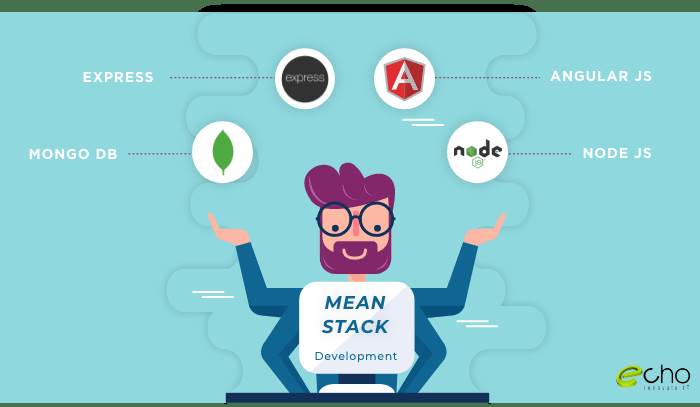In this age of digital websites and mobile applications, every business, no matter big or small is investing resources and money for designing applications for their enterprise. This is a laborious task and requires professional developers and the latest technology stacks. In today's world, there are innumerable technologies that create robust, dynamic applications. But, with the emergence of multiple technologies has made it difficult to choose the best stack technology to make the most out of one's investment. However, MEAN stack development technology is considered to be the most preferred technology out of all others. It is a widely used, open-source, user-friendly JavaScript-based technology. The article throws light on the concept of MEAN stack and explains why it's popularity is still in the rise for single page and multipage applications.
MEAN stack is one of the rapidly evolving open-source stack development technology that assists developers with robust tools to reduce the time consumed on system regulation. Besides the technology also allows for the fast development of web applications, websites, and APIs and also enables developers to focus on the complex development process of anyone's project.
MEAN Stack Technology: Definition & It's components
When developers need to do a full-scale web development project, the project involves various web technologies to be implemented like database systems, web servers, along with back end and front-end JavaScript Frameworks and runtime environments. For proper implementation, every technology requires different skills to be possessed by professional web developers. Only then will they be able to complete a web development project for a multipage.
MEAN stack is a JavaScript-based software stack used by planners to create dynamic websites and web applications. The technology is free and publicly available; the MEAN stack consists of a collection of convenient JavaScript Frameworks. MEAN stack web development is a kind of full-stack web development technology that comprises an amalgamation of 4 individual technologies:
Mongo DB as the database system
MongoDB is a database managing structure that stores data in binary JSON pattern work on the ways of documentation and collection. It is an adaptive document-oriented data monitoring system and thus it provides developers with standard performance, easy scalability, high availability features. As the system assists in web server JavaScript accomplishment, MongoDB allows the programmers to use a single programming language; JavaScript, for both server-side and client-side code. The MEAN stack development services for multipage enable developers to develop websites and applications using MongoDB without having to use conventional data managing software on a single page.
Express.JS as the back-end web framework.
Express.JS is a web-based application structure that supports and hosts Node.JS projects. It monitors the productivity between the database and the front end and allows data to be transferred easily to the user end. It has been designed to be used together with Node.JS. through this framework, one can handle errors most efficiently. The system provides developers with an amazing web designing performance, helping to arrange the web development process. The multipage framework employs the common module standard to inspect unforeseen overwriting of changeable within the common namespace. With the proper implementation of Express.JS, one can help avoid time wastage and error correction.
Angular.JS as the front-end JavaScript framework.
Angular.JS is another web development structure, monitored by Google. Angular.JS lets the developers use HTML as their template language and widen HTMl's structure to exhibit the application's elements briefly, clearly and precisely for single page app.
Node.JS as the back-end JavaScript runtime environment
Node.JS is a cross-platform, public domain that uses the JavaScript structure for building server-side and dynamic applications. The Node.JS applications are built-in JavaScript language, which can run within Node.JS anytime. The program offers a wide collection of JavaScript elements. This is the prime constituent of the MEAN stack. Expresso.js was created to work on top of Node.JS. Similarly, angular.js was created for working simultaneously with Node.JS, allowing smooth transfer of data. Node.JS comes with an amalgamated web server, that allows an efficient installation of the MongoDB database and application to the cloud.
MEAN stack technology has become the most widely used by web developers for multipage apps since it uses a single language, JavaScript. JavaScript can run smoothly on any platform, operating system and application.
Why Choose MEAN Stack Development?
What makes MEAN the preferable over other technology? Let’s find out by learning about the benefits you get by using this:
You can use isomorphic coding with MEAN
Using MEAN stack technology, developers can do isomorphic coding. By this, they can transfer codes to another structure easily. The process enables the MEAN stack development company to discover and experiment with various technologies.
Cost- Saving hiring
Any other form of full-stack technology like MEAN stack, is found to be more cost-effective for IT companies to employ as they don't need to recruit multiple professionals in various fields fo web development. A full-stack JavaScript professional would work, thus allowing coordination and collaboration among the various team members. MEAN stack lets the developers write the complete code from the client end to the server end in a single JavaScript. The JavaScript language is universal, dynamic, simple and adaptive. As every part of MEAN works on the same language, it doesn't require skilled professionals from different fields for its implementation, to build a web application. Thus, the technology helps in cutting down the developer's cost.
Mongo DB as the database
Because of modern features like NoSQL and a document model database, MongoDB is a well-known database system that is employed for monitoring web generated data having loads of database tables. This database is used as the back end database, which is suitable to be used in a variety of web applications. Those who aren't well versed in the MongoDB can alternatively use the PostgreSQL database system for employing it as the back end database system for full-stack web building on multipage. Are you planning to become a full-stack web developer with PostgreSQL database skills? You can opt to register yourself for a PostgreSQL course from a reputed training institute.
Use of Node.JS
The Node.JS interface complements the adaptive nature of the MEAN stack development process. Having features like web sockets and single thread Http requests, the Node.JS runtime environment can be considered to be an ideal addition to the full stack development process. Node.JS when compared to other web servers like apache, is found to be dynamic and scalable for concurrent web connections. Besides, the software is supported on various platforms like Linux, Ms Windows, etc.
Use of Angular.JS as the front-end framework
Angular.JS software is ideal for developing single-page applications. The amalgamation of this system with the MEAN stack technology has been a great addition to the entire development process as it enables JavaScript implementation on both the server end and client end. Enabled by google, Angular.JS lets developers implement interactive functions and ajax components on their client applications.
Public domain and a growing community support
Lastly, above all, the technologies employed by MEAN stack are all publicly available, thus supporting an evolving group of web developers who aim to provide regular software updates and feature updates. Similar to angular.js being supported by Google, the Node.JS technology is supported by major cloud providers like Azure and AWS.
Conclusion
MEAN stack employs a single language, the JavaScript for all its structures and applications. Hence, one doesn't have to learn new languages to develop web applications. JavaScript is easy to adapt and implement as well. Applications that have been developed employing the MEAN stack technology are desktop as well as mobile application compatible. So, one doesn't have to develop apps for mobile and desktop separately. The technology has been blessed with robust web development frameworks that are becoming better every day. MEAN enables the developers to work on a unique execution environment for their client end and server end for single page app.
MEAN supports the MVC framework. It assists developers in creating modern, dynamic, robust, fast and easily maintained applications and websites. Besides, it also offers employment opportunities for amateurs as well as professionals of MongoDB, angular.js, express.js and Node.JS.




Leave Comment